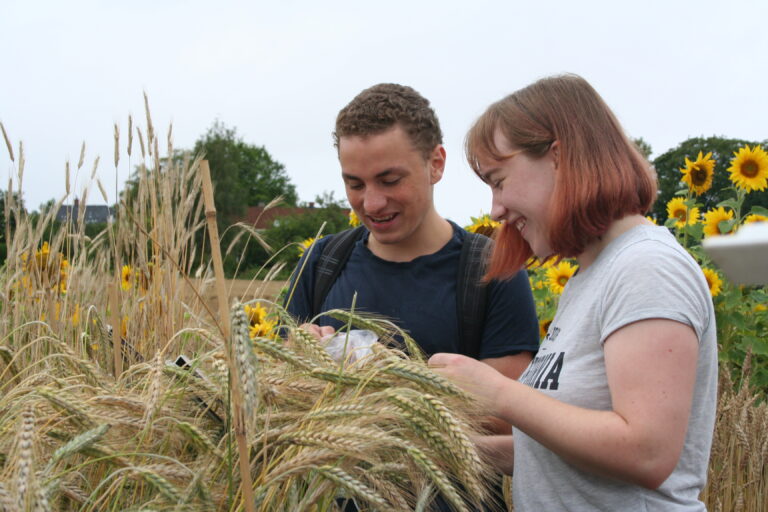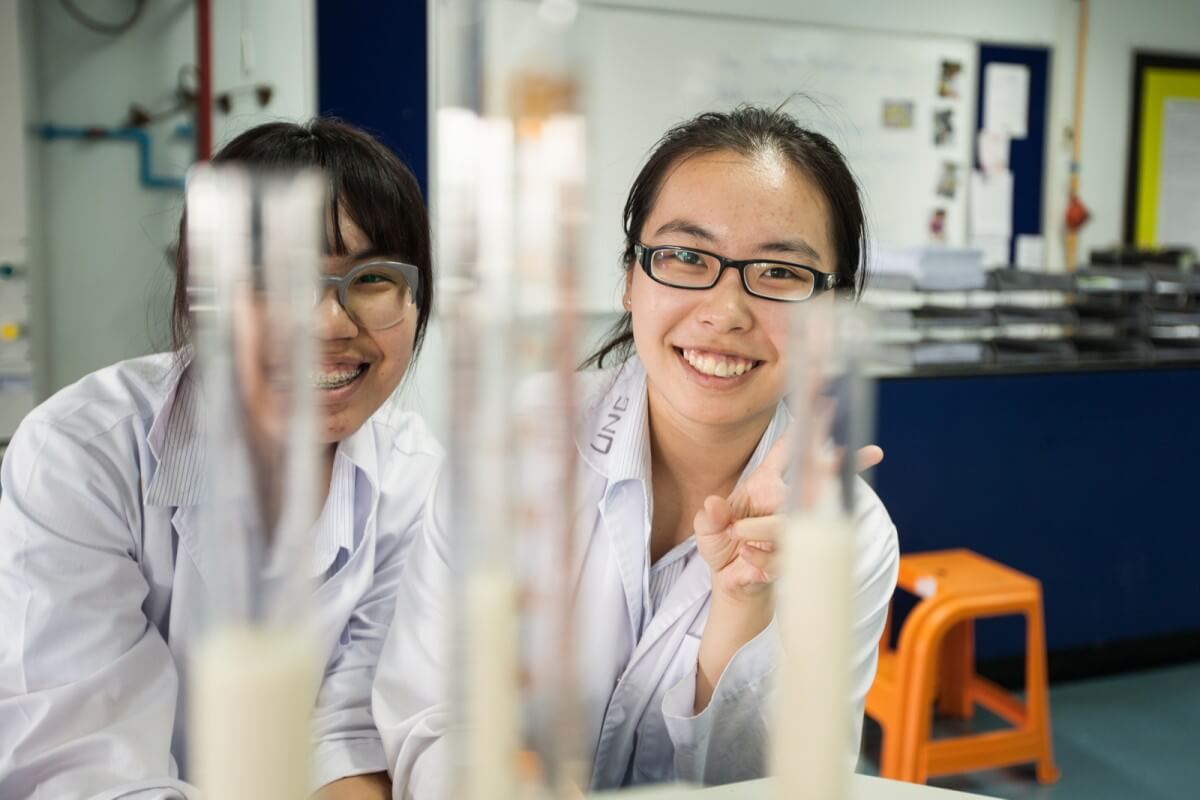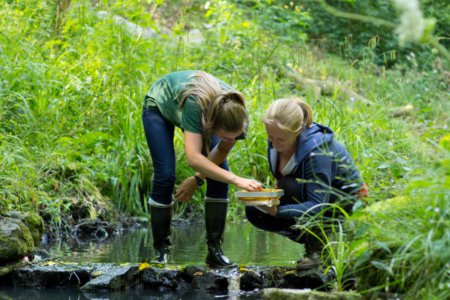
Food security is a global issue, with 3.1 billion people unable to afford a nutritious diet in 2021 and billions more affected in many other ways. And by 2030, the United Nations estimates a 50% surge in food, energy, and water needs.
Sustainable food production offers a solution. This approach prioritises long-term environmental health, unlike traditional methods that can be resource-intensive and damaging. More strategic practices like crop rotation, integrated pest management, and water conservation ensure soil fertility and minimise pollution. By adopting these methods, we can ensure food security while protecting our planet’s future.
To implement this, advanced knowledge in biosciences is required. This is where a master’s programme in Biosciences comes in. Such programmes can equip you with the expertise to ensure global access to safe, nutritious food while minimising the environmental footprint of our food systems.
If you’re passionate about tackling this challenge, consider studying for an advanced degree at these three leading universities in biosciences:

NMBU’s Faculty of Biosciences consists of a Department of Animal and Aquaculture Science, IHA and Department of Plant Science, IPV. Source: Norwegian University of Life Sciences
Norwegian University of Life Sciences
The Norwegian University of Life Sciences (NMBU) is paving the way for a more sustainable future. Ranked sixth in QS World University Rankings for Agriculture and Forestry, NMBU offers a vibrant environment 30 kilometres outside Oslo, nestled amidst stunning Norwegian scenery. Home to a community of 6,500 students and 2,000 staff, NMBU fosters a rich student experience, consistently ranking number one in national student satisfaction surveys for nine consecutive years.
The Faculty of Biosciences spearheads NMBU’s commitment to sustainable food production. Through research on plants, livestock, and fish, the faculty tackles the critical challenge of ensuring access to safe, nutritious food while minimising environmental impact.
The latest breakthroughs and case studies in these areas can be found in NMBU’s English-language master’s programmes: Animal Science, Genome Sciences, Agroecology, Aquaculture, Plant Sciences, Sustainable Food Systems, and Urban Agriculture. What’s more, students learn the complexities of “wicked problems” in sustainable development and craft innovative solutions like robotics and AI in agriculture or harnessing new genome technologies for improved breeding.
Hands-on learning is paramount at NMBU. NMBU’s research-based education enables close collaboration between students and faculty and access to on-campus research facilities, live animals, and plant fields. Partnerships with research centres and participation in large-scale projects like the NMBU Sustainability Arena: GreenSmart and Sustainable Food Systems solidify the university’s commitment to real-world impact.
For students seeking to shape the future of food production, NMBU offers a unique opportunity to combine academic excellence with practical application, all within a supportive and scenic environment. The chance to contribute to a master’s thesis in collaboration with industry partners adds another layer of real-world experience, preparing graduates to become leaders in sustainable food systems.

The University of Southampton is home to well-respected faculty members such as Professor Guy Poppy, one of the UK’s leading experts on food systems and food security. Source: University of Southampton Biological Sciences/Facebook
University of Southampton
The University of Southampton is a global top 100 university. Besides its impressive academic performance and research output, the school is ideally situated in the friendly and idyllic city of Southampton, which has earned the third spot in the list of the UK’s most affordable cities for students.
At the forefront of life science research, the University of Southampton’s School of Biological Sciences tackles critical global issues like food security and disease prevention. Their 50 million pounds life science building houses cutting-edge research facilities such as the Imaging and Microscopy Centre, Geospatial computing facility, and Histology microscopes, where specialists collaborate across six key themes: Cell and Developmental Biology, Ecology and Evolution, Microbiology, Molecular and Precision Biosciences, Neuroscience, and Plant and Food Security.
The Plant and Food Security research group exemplifies the university’s dedication to real-world problem-solving. The group focuses on plant-nematode, insect, and microbe interactions by studying plant responses to environmental challenges at various levels. Their research encompasses plant molecular biology, agricultural ecology, crop pests and pollinators, and human nutrition.
Their work is paving the way for a future with sustainable food security. It explores how to balance food production with environmental protection, all whilst developing nutrient-rich crops. Notably, they led a multi-million-pound project across Malawi, Colombia, and Peru, investigating nutritional health for populations living near agricultural and forest areas.
These are projects with profound impact. As Professor Guy M Poppy aptly states, “Around a billion people already experience food insecurity, while another billion struggle with obesity, and yet another billion are malnourished by not having a diet that provides a healthy lifestyle.”

The Department of Agri-Food Science and Technology at the University of Bologna has 12 million euros in annual revenue for research projects. Source: University of Bologna/Facebook
University of Bologna
Nestled in the heart of Italy, Europe’s eighth-largest economy and a global leader in manufacturing is the University of Bologna (Unibo). Founded in 1088, Unibo is the oldest continuously operating university in the Western world. This institution consistently ranks among Italy’s top five universities, attracting scholars seeking a quality education steeped in history.
While it may have a rich past, Unibo offers a forward-thinking curriculum. The Department of Agricultural and Food Sciences exemplifies this approach, featuring master’s programmes like Food Science and Technology.
This programme stands out for how interdisciplinary it is, providing students with in-depth knowledge of food science. Students benefit from close interaction with professors and gain valuable exposure through collaborations with regional, national, and international food manufacturing companies as well.
The curriculum is driven by cutting-edge research, ensuring students learn about the latest advancements in the field. Coursework encompasses diverse topics, ranging from process innovation and product formulation to predictive microbiology and the utilisation of biotechnology to reduce food waste. Students also learn food quality control, functional aspects of food, and innovative analytical techniques for food characterisation and market orientation.
Unibo prioritises international experiences. The programme nurtures student mobility through exchange programmes like Erasmus and other schemes, allowing students to gain practical experience through internships and thesis work abroad. Plus, the programme offers scholarships for participation in Blended Intensive Programmes (BIP) at international institutions.
The Department of Agricultural and Food Sciences also boasts robust research areas. One such area, Agricultural and Food Economics, focuses on applying economic principles to the agricultural and food sectors. Research activities cover markets, marketing trends, and consumer behaviour of agri-food products. What’s more, researchers explore firm and supply chain organisation, rural and environmental appraisal, and the ever-evolving legal landscape governing agriculture, environment, and food.
*Some of the institutions featured in this article are commercial partners of Study International










